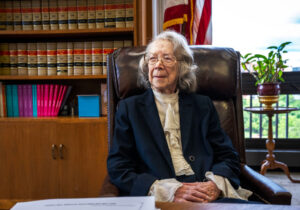
Pauline Newman Speaks: ATL Interviews The Judge Who’s Fighting To Do Her Job

(Photo by Bill O’Leary/The Washington Post via Getty Images)
Judge Pauline Newman really likes her job. After being asked to take senior status which, mind you, considerably lightens the workload and pays the same amount, she refused — as she was well within her rights to do. Federal judges are appointed for “good behavior,” which is functionally a lifetime appointment barring impeachment by the House of Representatives and conviction by the Senate. Despite none of those things happening, she’s currently functionally impeached — she hasn’t heard a case since March. The many steps that led up to her renewable yearlong suspension are rife with conflicts of interest and due process shenanigans. The thing about being suspended from cases is that it frees up your schedule for an interview or two.
googletag.cmd.push( function() { // Display ad. googletag.display( "div-id-for-top-300x250" ); });Here is a (lightly edited and condensed) write-up of our conversation about gag orders, the fitness complaints levied against her, and the Constitution.
 Sponsored Pickleball, Pancakes, and PhDs – Balancing Law And Life Think you need to sacrifice one thing for the other? Think again. From Peerpoint
Sponsored Pickleball, Pancakes, and PhDs – Balancing Law And Life Think you need to sacrifice one thing for the other? Think again. From Peerpoint Chris Williams (CW): All right. So, you’ve earned the title of being a big dissenter with your opinions. Could you talk a little bit about the importance of dissenting, either specific to patent law or the law in general?
Judge Pauline Newman (JN): There’s, of course, several, but, one aspect that hadn’t really penetrated to me until all of this argument about dissents starting came out came when Rochelle Dreyfus, who teaches Patent Law at NYU, told me that her course consists entirely of opinions in which I’ve dissented. So, I was charmed, but we kind of pursued it, and she says the reason is in every judicial opinion, the people decide whether it is, whether it’s a panel, whether it’s one judge, or the whole in en banc court, when you decide how it ought to come out in all good faith and objectivity and everything else, then you explain why you went the way you went, and you give the reasons, and you give the precedent that you’re relying on, and how this fits all of the reasons why a case is decided the way it was decided, and you might even mention some of the arguments on the other side, but they never get the full exposition, the full development. And so the way Rochelle explained it to me, she says, you can’t really tell what fine lines a court might have been drawing unless you really see the strain of the argument that was rejected.
And of course, the dissent was rejected by a majority of some sort. So that’s really why she’s out. She says that more often than not, cases are close on the facts. That’s why people are in litigation spending all those millions of dollars. Of course, there may be other reasons as well, but that’s one of them. Usually you think you have a chance, maybe not always. And she says, without the dissent, she says, case after case. And then she recites the famous dissents of Holmes and Marshall and others, that it really explains the law to the student. So that sort of made me feel even better that it wasn’t just me telling my colleagues what a bunch of dummies they were, which seems to be how a dissent is perceived. And also, I had gotten in the habit after reading, uh, some of the dissents the judges have written that they’re generally always written in strong language. And so, apparently I’ve gotten in the habit of writing forcefully. And it has not endeared me through to my colleagues.
CW: What are your thoughts on the constitutional grounds of what’s happening? At first it seemed like they wanted you to take senior status to take fewer cases. And now the committee has suspended you for a year, and it’s done in such a way where they may decide next year to renew the suspension. What are your thoughts on what the Constitution has to say about their functional impeachment?
JN: Well, I think it’s absolutely in violation of the Constitution. That’s not a close question that I was appointed by the President and approved by the Senate. My colleagues on this court cannot remove me.
googletag.cmd.push( function() { // Display ad. googletag.display( "div-id-for-middle-300x250" ); }); googletag.cmd.push( function() { // Display ad. googletag.display( "div-id-for-storycontent-440x100" ); }); googletag.cmd.push( function() { // Display ad. googletag.display( "div-id-for-in-story-youtube-1x1" ); });There, there is a good deal to be said for the need to, if you have a judge or anyone else who’s disabled and not thinking straight and all the rest of it, and doesn’t have the sense to see that that’s what’s happening. And apparently that does often happen to the mind. You don’t know that you slipped. But, and recognizing that, you know, there’s this very elaborate structure that Justice Breyer has been had written that was enacted to evaluate disability of judges. And that’s been drawn upon what, maybe eight or 10 times over the history of the judiciary. And I think some judges have stepped down or been removed in that context. It does have to be some such system. But, they haven’t said, first you’re off the bench, you’re not going to hear another case while we decide whether you’re disabled or not. And of course, that’s what they did here. In my case, I haven’t heard a case since March. So it isn’t just a year from when this debate is over, plus whatever extension, I think just in case, because they’ve all heard me say, I’m going live forever. So just in case I do do that…
CW: Well, you’ve done well so far!
JN: I think that is part of their concern, that I do have that magic gene that doesn’t know when to stop.
CW: I know there was a point that you requested the matter be transferred to a different circuit for the obvious due process and conflict of interest reasons. Do you think that Chief Justice Roberts has a potential role in this? Because this seems like more of a workplace spat with Judge Kimberly Moore than something credible.
JN: No, he didn’t take himself out of it. The procedure is very elaborate, 50 pages. The Supreme Court has a disability committee. When we filed the request to transfer it to another circuit, the way it was written — for reasons that I think were just a kind of efficiency — was that the transfer request should come from the Chief Judge of the court who’s being considered. But in my case, the Chief Judge refused to initiate it. So we filed it anyway. We were just asking for a transfer.
And, almost by return mail, we got a response from the Chairman of that committee saying that we don’t yet have a final decision. It was just one or two lines. He says, you don’t have a final decision, therefore we don’t have jurisdiction until you have a final decision of your court. And this was probably last April, because we did that right away. So Roberts and the judicial conference never said they had no role in this. All they said was that at the time we asked them, it was premature. So ever since then, we have been trying to push it and promote it to a final decision.
Amid all of the other district judges and everyone who commented saying the district judge isn’t going to be too charmed by being asked to decide this squabble among circuit judges. So what this district judge did was ordered mediation.
And so we did. So we went to mediation and my side made a lot of concessions I didn’t want to make, but I didn’t agree to step down. I told them that I’d make all these concessions provided you put me back to work until we get a final judgment. They refused to do that. So essentially, the mediator came back and told us, “No, they won’t budge.”
CW: When’s the last time you’ve given an interview?
JN: I talked to the ABA just a couple of days ago.
You know, being involved in litigation, the lawyers have told me that it’s better not to appear in public and not to talk about things. And I followed that advice for a few months when all of this noise started. And I learned that I was being outmaneuvered at every step because everything that they did would be published or on the court’s webpage as if it were a decision of the court. And they had a gag order on my counsel and threatened him with contempt if he violated the confidentiality. Of course we complained about that. Then when it suited them, they would release it saying, “Well, this is what you wanted.” And of course, we had no chance to respond. So that went on for several months. So now, I really thought I have to speak out because that’s about all that I can do. I don’t have a forum. I decided against Twitter or X or whatever it’s called, although I thought about it as about the only possibility of getting whatever I wanted to say, said somewhere where it could be seen.
CW: Especially for a person on the outside looking in, it’s hard to think and realize the PR element of these sort of disputes. You don’t think about public relations and the court in the same breath — it’s supposed to be the impartial branch, you know! I didn’t even think about how gag orders could be deployed strategically in a situation like this.
JN: Well, they were illegal.
CW: Have you spoken to any of your colleagues?
JN: Yes. One came to see me. This is published somewhere — in the very beginning to essentially say quit while you’re ahead. He has never spoken publicly. None of my colleagues have come to me to say, we know that you’re healthy.
This saying and publishing that I had a heart attack when I never did, saying that I have a stent. It’s easy enough to find if someone has a stent. To which my answer was, I have no need to go through a head to toe MRI. And if I leave out even my little toe, they’ll say, well, that’s where the stent is.
CW: For the things you can demonstrably prove are false, like accusing you of having a heart attack which medical records can disprove, shouldn’t there be some consequence for your accusers? Was Judge Moore under oath for any of this?
JN: I hope so. But in looking back, she said very little under oath. However, when you identify yourself as a complainant in an official document, put in an official record, and sign as the complainant, even though it doesn’t say, I swear I’m telling the truth, to lie, I think cannot be condoned.
This is so strange that I cannot find a rational explanation. But what I worry about is that if all of this is so irrational, is this is the court that’s running the most important cases that come before the judiciary — those that are related to technology and recovering our technological leadership. And whatever is motivating this is beyond easy remedy. It certainly seems to me that it is ripe for impeachment.
***
I appreciate the occasional conflict here and there, but I’m not one to entertain a war of attrition with Judge Newman. Even when she’s “wrong,” she has a statistically significant chance of being vindicated when the Supreme Court takes a look at the matter. Play the waiting game if you want to, but she’s on very strong Constitutional ground and she talks like she’s planning to live forever — and I think she just might pull it off.
 Chris Williams became a social media manager and assistant editor for Above the Law in June 2021. Prior to joining the staff, he moonlighted as a minor Memelord™ in the Facebook group Law School Memes for Edgy T14s. He endured Missouri long enough to graduate from Washington University in St. Louis School of Law. He is a former boatbuilder who cannot swim, a published author on critical race theory, philosophy, and humor, and has a love for cycling that occasionally annoys his peers. You can reach him by email at [email protected] and by tweet at @WritesForRent.
Chris Williams became a social media manager and assistant editor for Above the Law in June 2021. Prior to joining the staff, he moonlighted as a minor Memelord™ in the Facebook group Law School Memes for Edgy T14s. He endured Missouri long enough to graduate from Washington University in St. Louis School of Law. He is a former boatbuilder who cannot swim, a published author on critical race theory, philosophy, and humor, and has a love for cycling that occasionally annoys his peers. You can reach him by email at [email protected] and by tweet at @WritesForRent.
 Sponsored InterAction+ Brings Power Of CRM Software To Law Firms Of All Sizes The only legal CRM with exclusive content from LexisNexis®. From LexisNexis® InterAction+™
Sponsored InterAction+ Brings Power Of CRM Software To Law Firms Of All Sizes The only legal CRM with exclusive content from LexisNexis®. From LexisNexis® InterAction+™  Sponsored Announcing Ontra Atlas, Modern Entity Management Built for Private Equity Ontra Atlas extends Ontra’s Legal Operating System, an AI-enabled platform that digitally transforms critical legal workflows. From Ontra
Sponsored Announcing Ontra Atlas, Modern Entity Management Built for Private Equity Ontra Atlas extends Ontra’s Legal Operating System, an AI-enabled platform that digitally transforms critical legal workflows. From Ontra  Sponsored Beyond the Billable Hours: Finding Purpose in Your In-House Role Whether you're a seasoned attorney looking to rekindle your passion or a new professional navigating the challenges of the legal world, join us on October… From Axiom and Above The Law
Sponsored Beyond the Billable Hours: Finding Purpose in Your In-House Role Whether you're a seasoned attorney looking to rekindle your passion or a new professional navigating the challenges of the legal world, join us on October… From Axiom and Above The Law  Sponsored The Comprehensive Guide To AI For Private Equity Private equity firms need purpose-built legal AI to get real results. Ontra’s guide explores the risks of generic AI and how to evaluate AI vendors. From Ontra
Sponsored The Comprehensive Guide To AI For Private Equity Private equity firms need purpose-built legal AI to get real results. Ontra’s guide explores the risks of generic AI and how to evaluate AI vendors. From Ontra  Sponsored Pickleball, Pancakes, and PhDs – Balancing Law And Life Think you need to sacrifice one thing for the other? Think again. From Peerpoint
Sponsored Pickleball, Pancakes, and PhDs – Balancing Law And Life Think you need to sacrifice one thing for the other? Think again. From Peerpoint  Sponsored The Comprehensive Guide To AI For Private Equity Private equity firms need purpose-built legal AI to get real results. Ontra’s guide explores the risks of generic AI and how to evaluate AI vendors. From Ontra Topics
Sponsored The Comprehensive Guide To AI For Private Equity Private equity firms need purpose-built legal AI to get real results. Ontra’s guide explores the risks of generic AI and how to evaluate AI vendors. From Ontra Topics Courts, Judge Pauline Newman, Pauline Newman
Introducing Jobbguru: Your Gateway to Career Success
The ultimate job platform is designed to connect job seekers with their dream career opportunities. Whether you're a recent graduate, a seasoned professional, or someone seeking a career change, Jobbguru provides you with the tools and resources to navigate the job market with ease.
Take the next step in your career with Jobbguru:
Don't let the perfect job opportunity pass you by. Join Jobbguru today and unlock a world of career possibilities. Start your journey towards professional success and discover your dream job with Jobbguru.
Originally posted on: https://abovethelaw.com/2023/10/pauline-newman-speaks-atl-interviews-the-judge-whos-fighting-to-do-her-job/